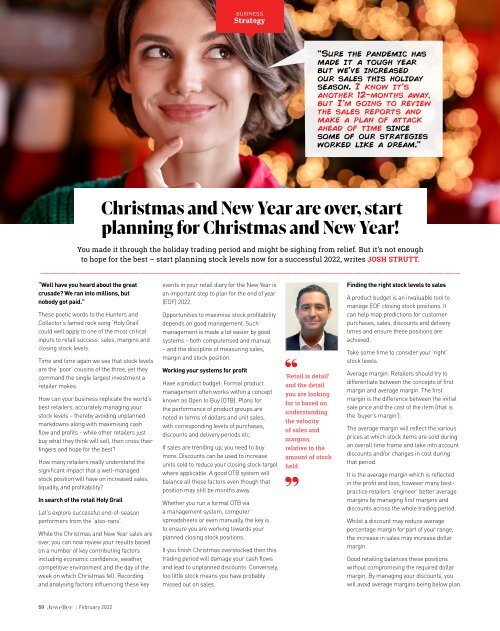Jeweller - February 2022
• Stronger together - Buying Groups get ready for 2022 with newfound vigour • The Great Retail Reset - Pandemic demonstrates that every cloud has a silver lining • Vale Peter Beck - Tribute to a jewellery industry icon
• Stronger together - Buying Groups get ready for 2022 with newfound vigour
• The Great Retail Reset - Pandemic demonstrates that every cloud has a silver lining
• Vale Peter Beck - Tribute to a jewellery industry icon
Create successful ePaper yourself
Turn your PDF publications into a flip-book with our unique Google optimized e-Paper software.
BUSINESS<br />
Strategy<br />
"Sure the pandemic has<br />
made it a tough year<br />
but we've increased<br />
our sales this holiday<br />
season. I know it's<br />
another 12-months away,<br />
but I'm going to review<br />
the sales reports and<br />
make a plan of attack<br />
ahead of time since<br />
some of our strategies<br />
worked like a dream.”<br />
Christmas and New Year are over, start<br />
planning for Christmas and New Year!<br />
You made it through the holiday trading period and might be sighing from relief. But it’s not enough<br />
to hope for the best – start planning stock levels now for a successful <strong>2022</strong>, writes JOSH STRUTT.<br />
“Well have you heard about the great<br />
crusade? We ran into millions, but<br />
nobody got paid.”<br />
These poetic words to the Hunters and<br />
Collector’s famed rock song ‘Holy Grail’<br />
could well apply to one of the most critical<br />
inputs to retail success: sales, margins and<br />
closing stock levels.<br />
Time and time again we see that stock levels<br />
are the ‘poor’ cousins of the three, yet they<br />
command the single largest investment a<br />
retailer makes.<br />
How can your business replicate the world’s<br />
best retailers, accurately managing your<br />
stock levels – thereby avoiding unplanned<br />
markdowns along with maximising cash<br />
flow and profits - while other retailers just<br />
buy what they think will sell, then cross their<br />
fingers and hope for the best?<br />
How many retailers really understand the<br />
significant impact that a well-managed<br />
stock position will have on increased sales,<br />
liquidity, and profitability?<br />
In search of the retail Holy Grail<br />
Let’s explore successful end-of-season<br />
performers from the ‘also-rans’.<br />
While the Christmas and New Year sales are<br />
over, you can now review your results based<br />
on a number of key contributing factors<br />
including economic confidence, weather,<br />
competitive environment and the day of the<br />
week on which Christmas fell. Recording<br />
and analysing factors influencing these key<br />
events in your retail diary for the New Year is<br />
an important step to plan for the end of year<br />
(EOF) <strong>2022</strong>.<br />
Opportunities to maximise stock profitability<br />
depends on good management. Such<br />
management is made a lot easier by good<br />
systems – both computerised and manual<br />
– and the discipline of measuring sales,<br />
margin and stock position.<br />
Working your systems for profit<br />
Have a product budget: Formal product<br />
management often works within a concept<br />
known as Open to Buy (OTB). Plans for<br />
the performance of product groups are<br />
noted in terms of dollars and unit sales,<br />
with corresponding levels of purchases,<br />
discounts and delivery periods etc.<br />
If sales are trending up, you need to buy<br />
more. Discounts can be used to increase<br />
units sold to reduce your closing stock target<br />
where applicable. A good OTB system will<br />
balance all these factors even though that<br />
position may still be months away.<br />
Whether you run a formal OTB via<br />
a management system, computer<br />
spreadsheets or even manually, the key is<br />
to ensure you are working towards your<br />
planned closing stock positions.<br />
If you finish Christmas overstocked then this<br />
trading period will damage your cash flows<br />
and lead to unplanned discounts. Conversely,<br />
too little stock means you have probably<br />
missed out on sales.<br />
‘Retail is detail’<br />
and the detail<br />
you are looking<br />
for is based on<br />
understanding<br />
the velocity<br />
of sales and<br />
margins,<br />
relative to the<br />
amount of stock<br />
held.<br />
Finding the right stock levels to sales<br />
A product budget is an invaluable tool to<br />
manage EOF closing stock positions. It<br />
can help map predictions for customer<br />
purchases, sales, discounts and delivery<br />
times and ensure these positions are<br />
achieved.<br />
Take some time to consider your ‘right’<br />
stock levels.<br />
Average margin: Retailers should try to<br />
differentiate between the concepts of first<br />
margin and average margin. The first<br />
margin is the difference between the initial<br />
sale price and the cost of the item (that is<br />
the ‘buyer’s margin’).<br />
The average margin will reflect the various<br />
prices at which stock items are sold during<br />
an overall time frame and take into account<br />
discounts and/or changes in cost during<br />
that period.<br />
It is the average margin which is reflected<br />
in the profit and loss, however many bestpractice<br />
retailers ‘engineer’ better average<br />
margins by managing first margins and<br />
discounts across the whole trading period.<br />
Whilst a discount may reduce average<br />
percentage margin for part of your range,<br />
the increase in sales may increase dollar<br />
margin.<br />
Good retailing balances these positions<br />
without compromising the required dollar<br />
margin. By managing your discounts, you<br />
will avoid average margins being below plan.<br />
50 | <strong>February</strong> <strong>2022</strong>


















